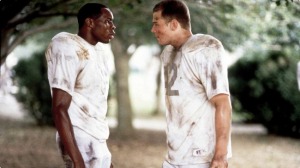
We’re talking about Mizzou again.
Today’s tone is not comical; the topic of discussion contains no obnoxious student sections. Today’s post carries the weight of a civil rights movement that has been fought for since the beginning of America. I had a different post 85% written and planned to post this week, but I could not ignore the out roar occurring in Columbia, Missouri right now. I did not want to wait a week to publish this piece. I’m sure that most of you have heard about the situation. It’s been hard to miss. The entire predicament exploded rather quickly, so hopefully this article clears some things up for you.
I wanted to give my take on the situation at hand. There are a lot of factors that go into a situation such as this one, and I hope to cover the ones that pertain most to the theme of my blog. I also want to provide a disclaimer saying that I cannot offer complete empathy. I am not an African American. I do not fully understand the nature of the situation that these people have gone through and are going through right now. However, that doesn’t deny me my thoughts and my knowledge of history. That does not deny me my time as an athlete that I’ve shared with plenty of black teammates that shared all kinds of personalities and interests. With this post, I hope to respect this relationship that I’ve grown with the African American community through sports and display my opinion on the actions taking place in Columbia. Let’s dive in.
protest
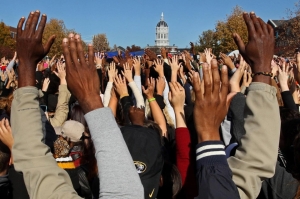
Here are the events that unfolded in the process of this social uprising.
Several racist incidents have been reported this fall at the University of Missouri. The specific example that has triggered the outcry was on November 5th, when members of the Legion of Black Collegians were called the N-word while rehearsing for homecoming festivities. The University’s response to actions such as these that had taken place recently was the issue. There was no response; the university was mute. At a homecoming parade on November 10th, members of Concerned Student 1950 blocked the university president Tim Wolfe’s car. Concerned Student 1950 is a student group named for the year that the first black graduate student was admitted to the university.
Reported by the Columbia Missourian, “Wolfe did not respond to the group’s concerns while he was in the car. His driver revved the convertible’s engine, and the car bumped into Jonathan Butler, a graduate student who is one of the group’s members.” This additional display of disinterest led to more tempers flaring and public awareness rising for the situation. On November 6th, Wolfe met with members of the group and apologized, stating that racism “existed and was unacceptable” on campus. For the people who had been riled up as a result of Wolfe’s actions, such as Jonathan Butler, this apology was too little and too late.
By November 2nd, Butler had began a hunger strike that he claimed would last until Wolfe resigned or until he himself died from starvation. Concerned Student 1950 supported this protest. The group called for eight specific demands. For full descriptions of these demands, I urge you to click on the hyperlink I provided on the text above. The Missouri football team joined this clause, with 32 of the players saying they would go on strike. Head coach Gary Pinkel stood behind his players and gave them support in their fight for their civil justice. He stated that his support was not in favor of removing Tim Wolfe, but in making sure his players knew he was behind them.
The hunger strike and the player strike ended on Monday, November 9th when Tim Wolfe formally resigned from the presidency.
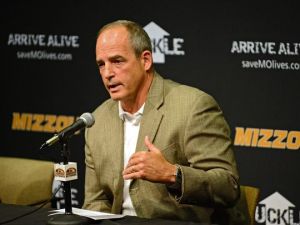
consequences
Jonathan Butler and Concerned Student 1950 got what they wanted in Wolfe stepping down. The fire they created, however, was only beginning. As the week has unfolded, the situation at Mizzou has gotten seemingly dangerous. The police department for the university sent out a campus wide email stating to request their services if anyone experienced the expression of any demeaning language or actions. Everyone is wary of the potential of the situation. The eyes of America are on Columbia.
As far as the football team was concerned, they almost lost a game at Arrowhead Stadium. The strike took place in between their previous game on November 5th against Mississippi State and their scheduled game against Brigham Young University this Saturday. Had the strike not ended quickly, the player’s strike would have led to the canceling of the game. Missouri would have had to pay BYU $1 million as a result, and they would not have been able to play at Arrowhead, home of the NFL team the Chiefs. The game is expected to go on as originally scheduled now.
Videos have gone viral of some of the protests that have taken place on campus and around the area of Columbia. I will provide a couple controversial pieces of media that have come to rise in the past week.
You really need to watch those videos to get a feel for just how enormous this situation has become and the sentiment that is being expressed by an array of students and faculty.
critically speaking
It is hard for me to completely condone the actions and words that these protestors are including in their civil rights revolt. If you take time to watch the primary source of the first video, you’ll see a lot of issues with the way the protecting of the protestors was handled. The individual with the camera was doing his job! He had expressed no hostility or threat to the people in the tents protesting.
Unfortunately, I feel that this happens commonly anytime a protest for civil rights comes up. Just as I feel that a straight person cannot completely and accurately speak on behalf of the gay population, I feel that a person of a different race cannot completely and accurately speak on behalf of what African Americans have had to deal with and the challenges they currently face. There is certainly nobility in joining a movement for the advancement of civil rights. But I find the issue to be when people who do not share the qualities of the group being oppressed begin to spite other people who are similar to themselves. There are plenty of individuals in that first video who are not black. The dude with the camera is not black. Still, accusations and harassment are thrown his way for his role in abusing the protestors.
I apologize if I’m not begin 100% clear. This issue is one that needs to be treaded carefully, for it holds the basis of how we interact with each other not only as Americans but also as humans. What I’m saying for the situation in Columbia is this: I do not disagree with people joining the protest who are not black. What I disagree with is the attacking of the university and other students that these people of different racial backgrounds have done. I find this action rude! These people have never experienced what being black feels like, yet they are ready to ostracize other members of their own, very different race?
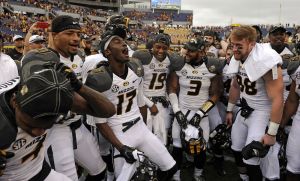
I find this to be doing the opposite of what the movement is striving for. The overall goal is better treatment of African Americans on the entire campus. That is noble. That is needed. But now the door is being opened for other races to be fighting internally. The result that is occurring is a mess. I find the Missouri football team’s approach to be very appropriate. They did not speak to the media during the strike, but they let their involvement be known. They showed support for the civil rights act but did not muddy the waters with their own words and accusations.
I’m not saying that other people don’t get it, but these players are black and white alike. They have played on teams that involved different races, yet they always strived for the same goal. They understand that the issue at hand is making sure we are all treated as family, and not as segregated individuals. I do not like the viewpoint that athletes are the cream of the crop in society and everybody should try to be like them. But perhaps everyone involved in this conflict can adopt the mindset of an athlete. We are all working towards the same goal; let’s stop fighting each other and instead make strides into allowing everyone the same opportunity to reach the same objective. Together.
Allow me to help further make my argument through some examples.
strong side
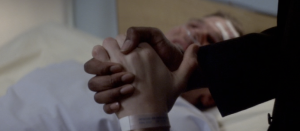
The scene in Remember The Titans when Julius Campbell visits Gerry Bertier in the hospital after his car crash was one of the first instances I remember of crying while watching a film. The team had fought throughout the entire movie over race relations and the merging of black players with white players to take the field with the same uniform on. Bertier and Campbell were a prime example of the evolving relationship between a black football player and a white football player at this school. In this particular scene, when Julius enters the room where Bertier was being taken care of, the nurse tells him, “Only kin’s allowed in here.” Bertier is heard from his bed, smiling and all beat to hell, saying, “Alice, are you blind? Don’t you see the family resemblance? That’s my brother.”
Bertier was paralyzed from the waist down. Based on his high school play, he had received many football scholarships headlined by the ones he got from Notre Dame and Alabama. He was an incredible talent. In the movie, when Campbell moves to his bedside, Bertier tells him, “I was afraid of you, Julius. I only saw what I was afraid of. And now I know that I was only hatin’ my brother.” Campbell responds with, “I’ll tell you what, though. When all this is over, you and I are gonna move out to the same neighborhood together. We’re gonna get old, we’re gonna get fat. There ain’t gonna be all of this black/white between us.”
I am an advocate for sports. I am an advocate for the emotional and social bonds that they create in the process of bringing out the best qualities in those who participate. I understand that the issue in Columbia is not based strictly on the football team. The issue at hand is the treatment of black people as a whole at the university. But the best way that I know how to make my argument and point is through sports. That is the language that I am most fluent in. The story of Remember The Titans is a true one. The issue at T.C. Williams High School in 1971, where the movie’s setting is located, is the attitudes of the black and white players who have been forced onto the same team.
This team went 13-0 and won the Virginia State Championship in the same year. The merger of these players resulted in one of the greatest high school teams to ever grace the ground of Virginia football history. This merger resulted in so much more than just a dominant team, however. The members of the Titans grew to love each other. They were brothers. They fought the social standards that were placed against their situation together. They succeeded together, ate together, cried together. The support of the Missouri football team for each other in this case of the strike parallels this sentiment.
the zoo
For the first three years of my high school career, the first weekend of the baseball season meant playing in a tournament at Copperas Cove High School. This might sound familiar because Heisman trophy winning Robert Griffin III played quarterback here before his collegiate career began. This particular story takes place in 2012, my freshman season. As I have stated before, I had the fortune to letter four years on my high school team. This was the first trip I was taking as a varsity high school baseball player.
Enter Cedric Robertson, Ronnie Baker, and Dae Payton. They were the black players that were currently on the roster for our team. Each one of them holds a specific memory in my brain that shows their impact on my athletic career. Cedric (we called him “Ced”) was one of the absolute funniest people I have ever met. He was wild, he was ridiculous, he was so fast. I owe a lot of my high school laughs to him. Ronnie was one of the most humble players I’ve ever had the pleasure of playing with. He was the obvious captain of our team, but you wouldn’t know that if you asked him. He was born without cartilage on one of his ankles, so it hurt every time he ran. Ronnie was an incredible hitter, and his style of play during my freshman year has helped keep me grounded to this day. Dae Payton is one of the most athletic people that I have ever known. In high school, he would plow through defenses as a running back and then get on a mound and throw 80+ miles per hour. He was a force to be reckoned with.
Keep these players in mind. I forget if this was the first game of the season, but the opposing team was definitely the Killeen Kangaroos. Their team was primarily white. Cedric had gotten to first base somehow, and stole second. As he came back into the dugout after scoring, he told us that the center fielder and second baseman continuously called him a monkey while he was at second. Once that spread to everyone’s ears, you can imagine that emotions that it brought forth.
Words were thrown around the entire game. We wound up winning- actually, sorry, we wound up kicking their asses, 12-4. Their coach was incredibly upset at the way that we were going back and forth with their players. He told our coach at the time, Bruce Cox, that he “lived in the shadow of Connally High School” and that they could settle this matter sometime. Coach Cox in return said something to the tune of, “Why wait til then? I’ll kick your ass in the parking lot right now.” He knew of what was said to Cedric, and was not about to take words from anyone from Killeen on that day.
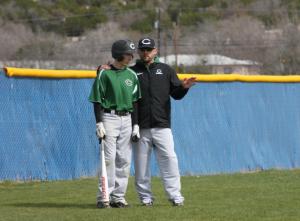
On the bus ride back, we actually poked fun at the hate words that were thrown toward Ced. The upperclassmen were all good friends with him, and they made sure to let him know that the team had his back. This concept was not stated directly… It was just understood through our actions on the field in defense of him. When I looked at Dae and at Ronnie, they weren’t viewing what was happening as a black vs. white dilemma. They saw it as an issue that was resolved by the team. As far as Coach Cox, his backing of Ced is still the most prominent display that I’ve personally witnessed of a coach protecting his team. Just as Pinkel felt it was necessary to be behind his players at Mizzou, Coach Cox knew it was a requirement to speak up for Ced.
final thoughts
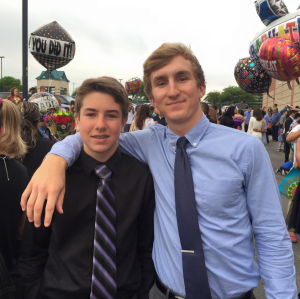
I know that I have held you for an extended period of time and your eyes may be growing weary of scanning the page in which this is written. For that, I apologize. I sat down in one setting and wrote all of these words because I felt that what is taking place at the University of Missouri is a test of our humanity and I needed to write about it. The picture shown above is one I took with my brother following his middle school graduation. I would do a lot of things in order to protect that kid and see him prosper. In a similar sense, I have lots of brothers that I’ve played with. On the field and in society, I would protect them and come to their aid if they needed it. These guys are black, white, hispanic, you name it. I have always had this mindset, so it is hard for me to see people fighting each other in the way that they are in Missouri right now.
I am not all knowing. I am not claiming to have the answer to the issue at hand. I am just trying to provide an argument through my experience with sports. When the actions on the field gain the opportunity to shape how we are as a society, the events that unfold usually find their way into history books and movies. Time will only tell how history remembers Mizzou in November of 2015. Hopefully, my words have helped you understand my personal viewpoint: change needs to occur in a manner that is respectful to everyone. I wish that sports could solve everything on the field. But they can’t. The actions taken by the Missouri football team and Gary Pinkel are a testament to how civil issues should be handled by sports teams.
Together we stand, divided we fall.

Thanks for following The Immortal Jukebox. I hope you will enjoy the wide variety of music featured and perhaps make some discoveries. I usually post once a week and your comments are welcomed. Regards and good luck with all your projects. Thom
LikeLike
Thanks Thom! Looking forward to your posts. Hope you enjoy this one!
LikeLiked by 1 person
Thank you. Well written…very tough topic. I liked your perspective on the football team actions…you made me look at it differently than I had up until now.
LikeLike
Very thought provoking post. Good job!
LikeLike
Thank you!
LikeLike